05 祈使句和选择疑问句-2023年(七升八)新八年级暑假衔接自学课(人教版)(带参考答案及详解)
文档属性
| 名称 | 05 祈使句和选择疑问句-2023年(七升八)新八年级暑假衔接自学课(人教版)(带参考答案及详解) |
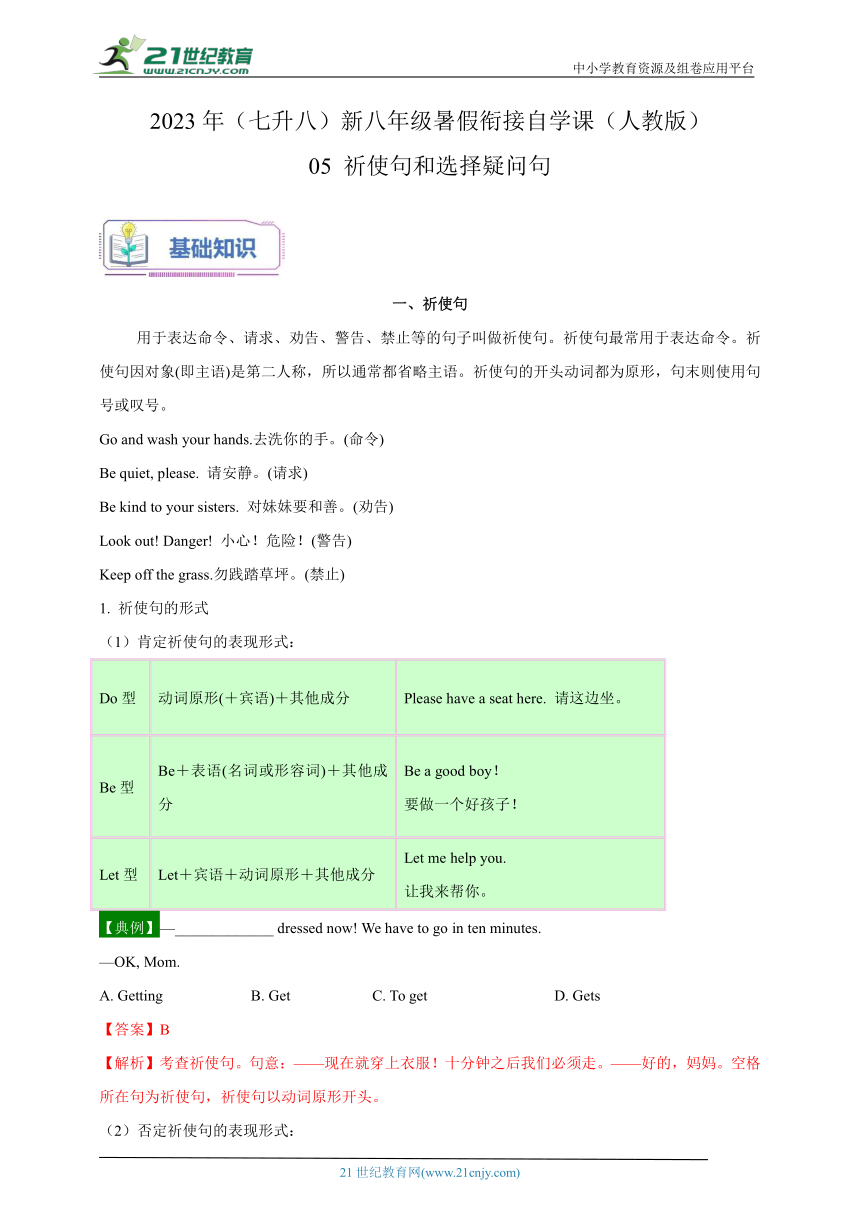
|
|
| 格式 | doc | ||
| 文件大小 | 370.1KB | ||
| 资源类型 | 试卷 | ||
| 版本资源 | 人教新目标(Go for it)版 | ||
| 科目 | 英语 | ||
| 更新时间 | 2023-07-03 00:00:00 | ||
图片预览

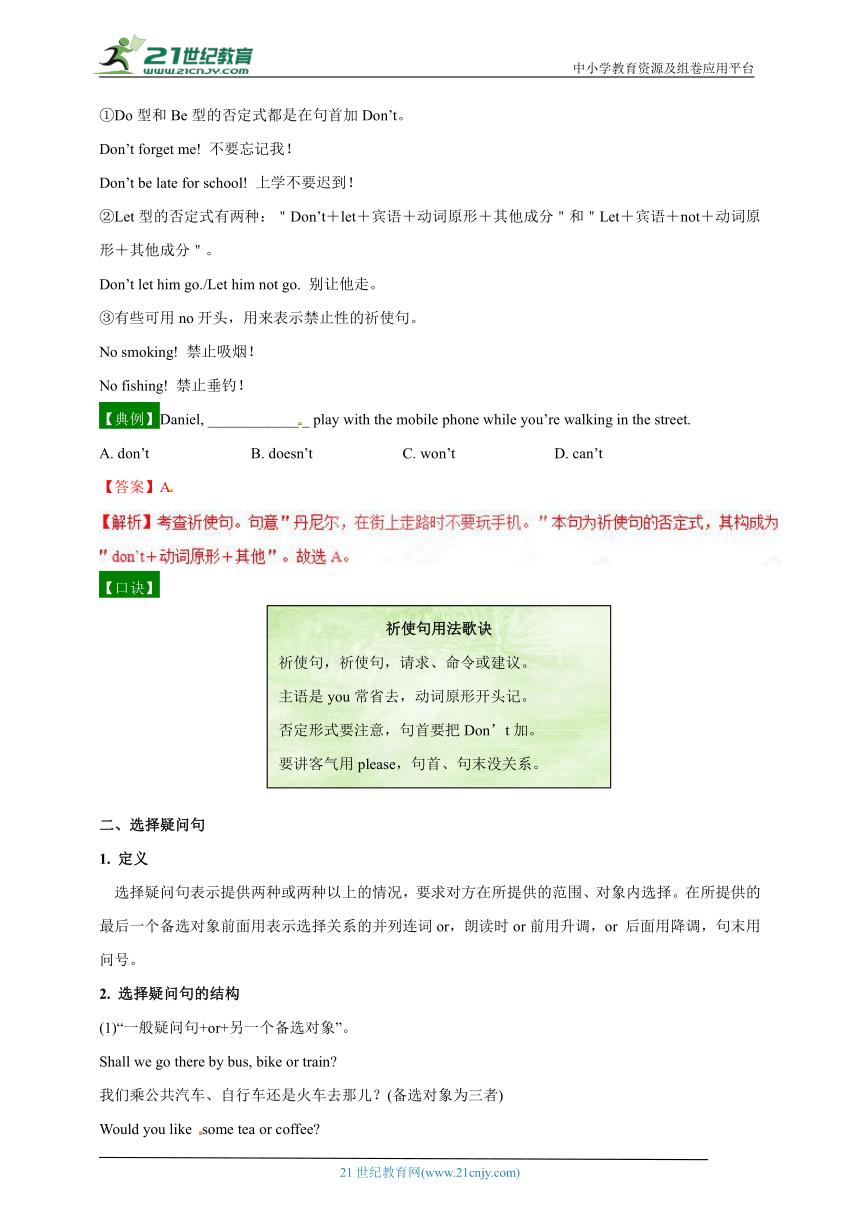
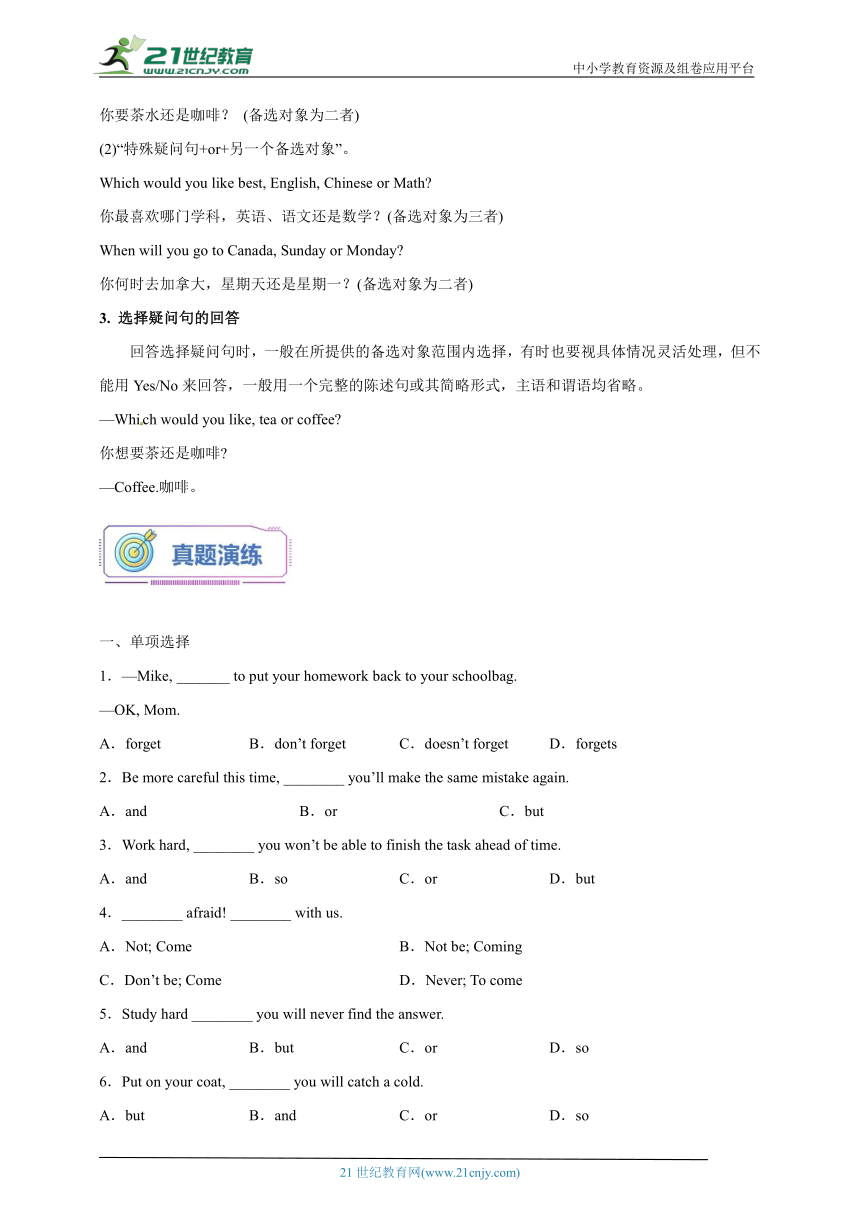
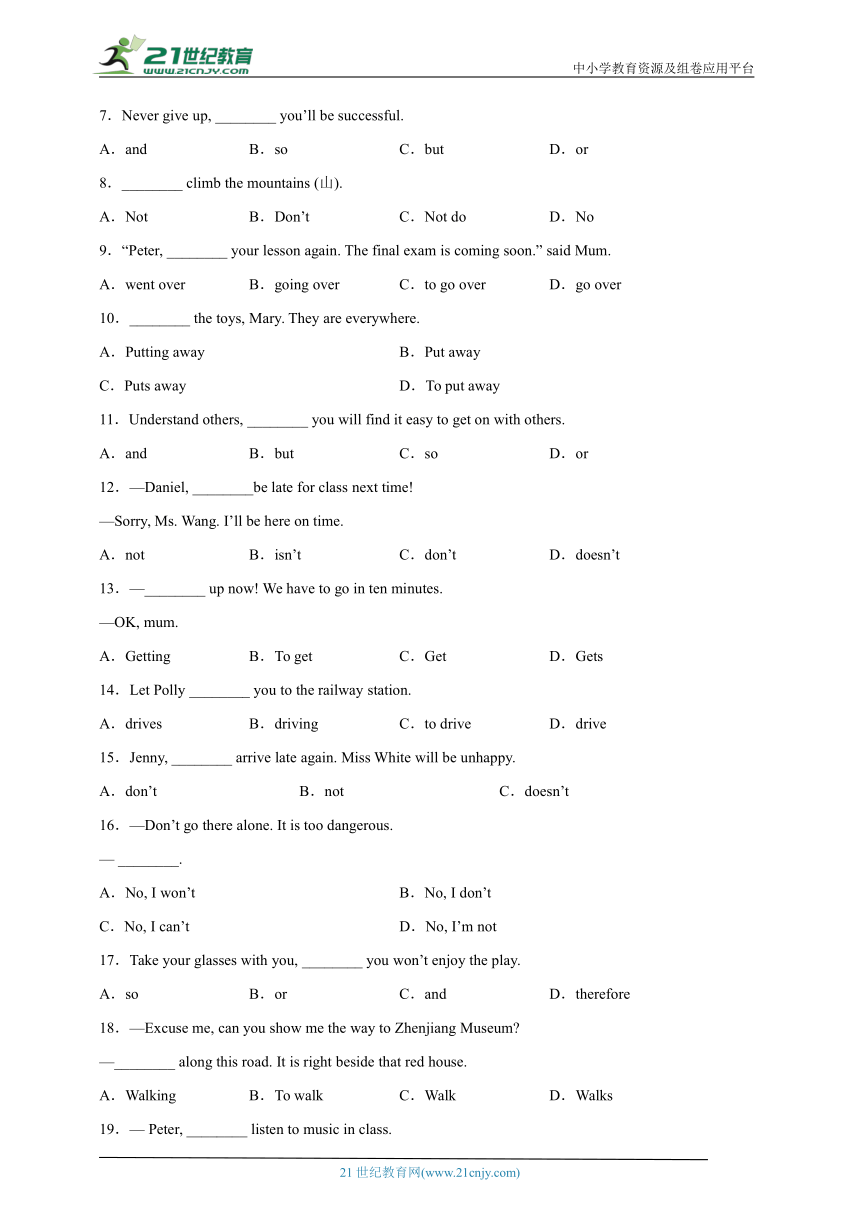
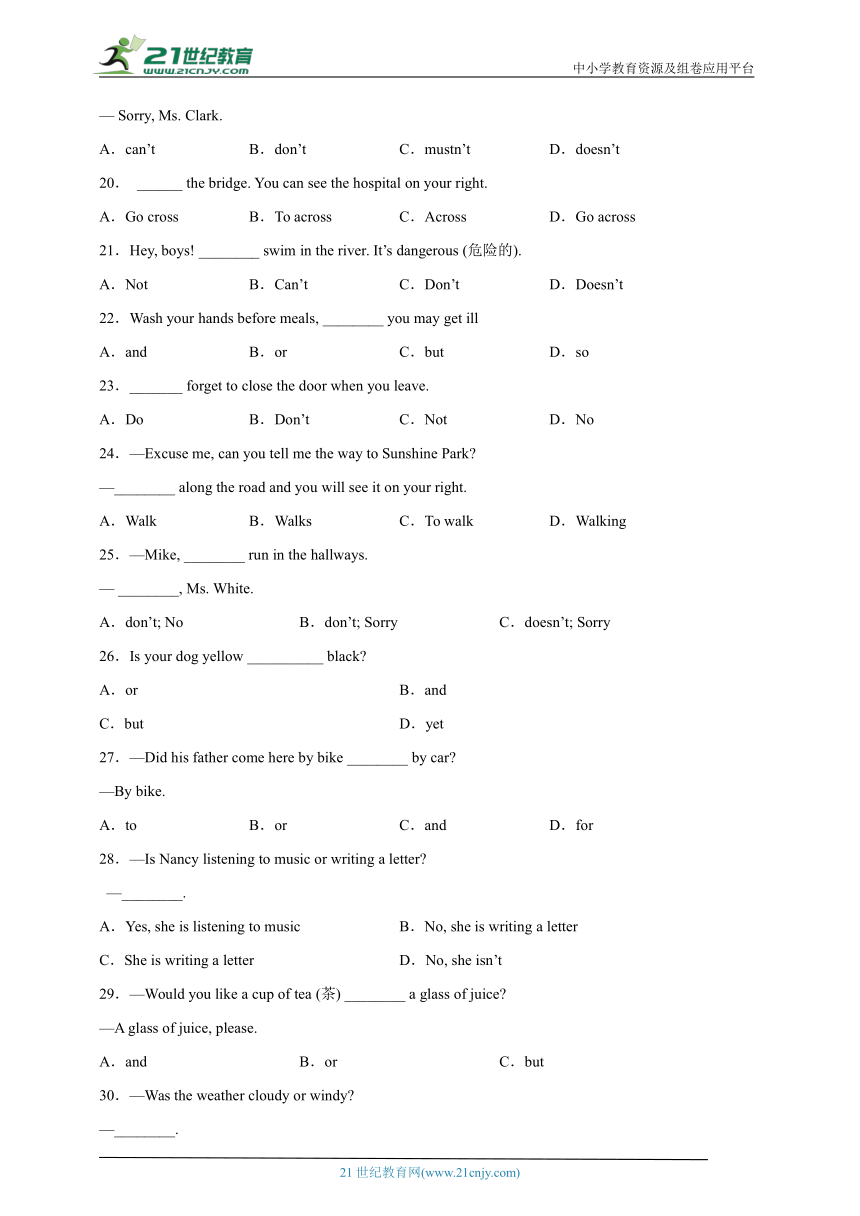
文档简介
中小学教育资源及组卷应用平台
2023年(七升八)新八年级暑假衔接自学课(人教版)
05 祈使句和选择疑问句
一、祈使句
用于表达命令、请求、劝告、警告、禁止等的句子叫做祈使句。祈使句最常用于表达命令。祈使句因对象(即主语)是第二人称,所以通常都省略主语。祈使句的开头动词都为原形,句末则使用句号或叹号。
Go and wash your hands.去洗你的手。(命令)
Be quiet, please. 请安静。(请求)
Be kind to your sisters. 对妹妹要和善。(劝告)
Look out! Danger! 小心!危险!(警告)
Keep off the grass.勿践踏草坪。(禁止)
1. 祈使句的形式
(1)肯定祈使句的表现形式:
Do型 动词原形(+宾语)+其他成分 Please have a seat here. 请这边坐。
Be型 Be+表语(名词或形容词)+其他成分 Be a good boy!要做一个好孩子!
Let型 Let+宾语+动词原形+其他成分 Let me help you.让我来帮你。
【典例】—_____________ dressed now! We have to go in ten minutes.
—OK, Mom.
A. Getting B. Get C. To get D. Gets
【答案】B
【解析】考查祈使句。句意:——现在就穿上衣服!十分钟之后我们必须走。——好的,妈妈。空格所在句为祈使句,祈使句以动词原形开头。
(2)否定祈使句的表现形式:
①Do型和Be型的否定式都是在句首加Don’t。
Don’t forget me! 不要忘记我!
Don’t be late for school! 上学不要迟到!
②Let型的否定式有两种:"Don’t+let+宾语+动词原形+其他成分"和"Let+宾语+not+动词原形+其他成分"。
Don’t let him go./Let him not go. 别让他走。
③有些可用no开头,用来表示禁止性的祈使句。
No smoking! 禁止吸烟!
No fishing! 禁止垂钓!
【典例】Daniel, _____________ play with the mobile phone while you’re walking in the street.
A. don’t B. doesn’t C. won’t D. can’t
【答案】A
【口诀】
二、选择疑问句
1. 定义
选择疑问句表示提供两种或两种以上的情况,要求对方在所提供的范围、对象内选择。在所提供的最后一个备选对象前面用表示选择关系的并列连词or,朗读时or前用升调,or 后面用降调,句末用问号。
2. 选择疑问句的结构
(1)“一般疑问句+or+另一个备选对象”。
Shall we go there by bus, bike or train
我们乘公共汽车、自行车还是火车去那儿?(备选对象为三者)
Would you like some tea or coffee
你要茶水还是咖啡? (备选对象为二者)
(2)“特殊疑问句+or+另一个备选对象”。
Which would you like best, English, Chinese or Math
你最喜欢哪门学科,英语、语文还是数学?(备选对象为三者)
When will you go to Canada, Sunday or Monday
你何时去加拿大,星期天还是星期一?(备选对象为二者)
3. 选择疑问句的回答
回答选择疑问句时,一般在所提供的备选对象范围内选择,有时也要视具体情况灵活处理,但不能用Yes/No来回答,一般用一个完整的陈述句或其简略形式,主语和谓语均省略。
—Which would you like, tea or coffee
你想要茶还是咖啡
—Coffee.咖啡。
一、单项选择
1.—Mike, _______ to put your homework back to your schoolbag.
—OK, Mom.
A.forget B.don’t forget C.doesn’t forget D.forgets
2.Be more careful this time, ________ you’ll make the same mistake again.
A.and B.or C.but
3.Work hard, ________ you won’t be able to finish the task ahead of time.
A.and B.so C.or D.but
4.________ afraid! ________ with us.
A.Not; Come B.Not be; Coming
C.Don’t be; Come D.Never; To come
5.Study hard ________ you will never find the answer.
A.and B.but C.or D.so
6.Put on your coat, ________ you will catch a cold.
A.but B.and C.or D.so
7.Never give up, ________ you’ll be successful.
A.and B.so C.but D.or
8.________ climb the mountains (山).
A.Not B.Don’t C.Not do D.No
9.“Peter, ________ your lesson again. The final exam is coming soon.” said Mum.
A.went over B.going over C.to go over D.go over
10.________ the toys, Mary. They are everywhere.
A.Putting away B.Put away
C.Puts away D.To put away
11.Understand others, ________ you will find it easy to get on with others.
A.and B.but C.so D.or
12.—Daniel, ________be late for class next time!
—Sorry, Ms. Wang. I’ll be here on time.
A.not B.isn’t C.don’t D.doesn’t
13.—________ up now! We have to go in ten minutes.
—OK, mum.
A.Getting B.To get C.Get D.Gets
14.Let Polly ________ you to the railway station.
A.drives B.driving C.to drive D.drive
15.Jenny, ________ arrive late again. Miss White will be unhappy.
A.don’t B.not C.doesn’t
16.—Don’t go there alone. It is too dangerous.
— ________.
A.No, I won’t B.No, I don’t
C.No, I can’t D.No, I’m not
17.Take your glasses with you, ________ you won’t enjoy the play.
A.so B.or C.and D.therefore
18.—Excuse me, can you show me the way to Zhenjiang Museum
—________ along this road. It is right beside that red house.
A.Walking B.To walk C.Walk D.Walks
19.— Peter, ________ listen to music in class.
— Sorry, Ms. Clark.
A.can’t B.don’t C.mustn’t D.doesn’t
20. ______ the bridge. You can see the hospital on your right.
A.Go cross B.To across C.Across D.Go across
21.Hey, boys! ________ swim in the river. It’s dangerous (危险的).
A.Not B.Can’t C.Don’t D.Doesn’t
22.Wash your hands before meals, ________ you may get ill
A.and B.or C.but D.so
23._______ forget to close the door when you leave.
A.Do B.Don’t C.Not D.No
24.—Excuse me, can you tell me the way to Sunshine Park
—________ along the road and you will see it on your right.
A.Walk B.Walks C.To walk D.Walking
25.—Mike, ________ run in the hallways.
— ________, Ms. White.
A.don’t; No B.don’t; Sorry C.doesn’t; Sorry
26.Is your dog yellow __________ black
A.or B.and
C.but D.yet
27.—Did his father come here by bike ________ by car
—By bike.
A.to B.or C.and D.for
28.—Is Nancy listening to music or writing a letter
—________.
A.Yes, she is listening to music B.No, she is writing a letter
C.She is writing a letter D.No, she isn’t
29.—Would you like a cup of tea (茶) ________ a glass of juice
—A glass of juice, please.
A.and B.or C.but
30.—Was the weather cloudy or windy
—________.
A.Yes, it is B.No, it wasn’t C.It was cloudy D.Yes, it was cloudy
31.—Is you mum happy or sad
—________.
A.Yes, she is happy. B.She is happy. C.No, she is sad. D.No, she isn’t.
32.—________ sweater do you like, the red one or the yellow one
—The yellow one.
A.What B.How C.Which D.Why
33.—Can Jim paint or sing
—________.
A.No, he doesn’t B.Paint, I think
C.Yes, he can D.He can’t dance
34.—Is Mike writing or reading
—____________.
A.Yes, he is . B.No, he isn’t. C.He’s not reading. D.He’s reading.
35.—Can you swim or play chess
—________ And I love swimming very much.
A.Yes, I can. B.No, I can’t. C.I can swim.
36.—Do you like playing the violin or drums
—________. It’s not noisy.
A.The drums B.The violin C.Yes, I do D.No, I don’t
37.—Cindy, what can you play, the violin ________ the piano
—I can play the piano.
A.but B.and C.so D.or
38.—Is Liu Ying thin or heavy
—__________.
A.Yes, she is B.No, she isn’t C.She’s thin D.She’s tall
39.—Does our new English teacher have a round or long face
—_______.
A.Yes, she does B.No, she doesn’t C.She has a round face D.She has a beautiful face
40.—Do you want to play basketball or dance to disco
—________
A.Yes, I do. B.No, I can’t. C.I want to dance to disco.
二、完形填空
通读下面短文,掌握其大意,然后在各小题所给的四个选项中,选出一个最佳答案.
Hello! I’m Tom. I’m a 41 in a middle school. Let me tell you about my 42 . I get up at half 43 six and have breakfast at fifteen to seven. I go to school at seven. In the morning, we have four lessons. 44 start at five past eight. We 45 an English lesson at five to nine, and at twenty to ten, we have a break for half a(n) 46 . I often talk with my friends in the classroom. We have 47 art lesson at ten past ten and P. E. at eleven, and then we have lunch. In the afternoon we have three lessons. I 48 at six at home and I often eat a lot. After dinner I 49 my homework. I 50 at nine o’clock. How about your day
41.A.classmate B.friend C.student D.teacher
42.A.school B.family C.day D.sport
43.A.past B.in C.on D.at
44.A.She B.He C.You D.They
45.A.have B.buy C.like D.help
46.A.week B.day C.hour D.minute
47.A.a B.an C.the D.不填
48.A.do sports B.play games C.have dinner D.watch TV
49.A.do B.know C.think D.thank
50.A.go home B.go to school C.go there D.go to bed
三、阅读理解
A
Jack is 15 years old. He wants to take his family-his parents and his sister Jessica out to lunch, so he wants to make money(挣钱) by helping his parents do some things.
Jack gets up at 6: 30, and then he cleans the house. At about 7: 00, he eats breakfast and then goes to school. He has four classes in the morning and three in the afternoon. At 5: 30, Jack goes home and he helps his mom buy food, or cleans the car for his father. Sometimes, his sister helps him. Jack has 95 dollars now. He still(还) needs 55 dollars. He is very happy. When he takes his family out to lunch, he will pay the bill.
51.There are ________ people in Jack’s family.
A.3 B.4 C.5 D.6
52.How does Jack make money
A.By working in a shop. B.By selling some things.
C.By writing some books. D.By doing some things for his parents.
53.What does Jack do before he goes to school
A.He buys food. B.He buys books. C.He cleans the house. D.He cleans the car.
54.Jack needs ________ dollars in all(总计) .
A.55 B.75 C.100 D.150
55.The underlined words “pay the bill” mean “________” in Chinese.
A.存钱 B.付账 C.做饭 D.度假
B
School Trip
Join us in a school trip to Boston on Sunday, May14th.
We’ll spend the morning in the city center. We’ll have lunch in the park. You don’t have to bring your lunch. In the afternoon, we’ll go fishing near Odinson Lake. And there will be a fishing class and a fishing race too.
Price: 20 dollars each
The bus leaves at 8:15. Please meet in front of the school library 15 minutes earlier. We’ll go back at 4:30 in the afternoon and arrive at the school at about 5:30 p. m.
We must follow these important rules.
①Don’t arrive late for the meeting time.
②Don’t give food to the birds on the lake.
③Don’t play with water or run near the lake.
④Don’t take the fish you get home with you.
Put them back into the lake after the class and the race.
If it is rainy that day, we can go free museum visiting instead. Don’t forget to take your umbrellas!
56.The students are going to ________.
A.live in a town B.go camping
C.visit a city D.walk in a forest
57.Students have to meet in front of the school library at ________.
A.8:00 a.m. B.8:15 a.m. C.8:00 p.m. D.8:15 p.m.
58.The twenty dollars for the trip may not include (包含) ________.
A.the bus rides B.the lunch C.the fishing D.the visit to the museum
59.Which of the following is right
A.Students can feed the birds on the lake.
B.Students will have a running race near the lake.
C.If it rains, students will spend the day in a museum.
D.Students can buy the fish they get and take them home.
60.This passage is probably ________.
A.news B.a notice C.an advertisement D. a story
四、短文填空。
John is a football player. He loves 61 job very much.
He usually 62 up at half past six, 63 a shower and then gets dressed. Before breakfast, he goes to the park and does some exercise. He usually runs 64 half an hour, but sometimes he just takes a 65 in the park. At 8 o’clock, John goes home and 66 breakfast. At 9: 30, John goes to the stadium (体育馆) and plays football 67 other players.
He usually has a football game in the afternoon. The game starts at two o’clock and finishes at a 68 to five. After the game, he has a drink with other players. In the evening, John 69 watches TV or reads a book at home. He’s very tired so he goes to bed very 70 —at half past nine.
参考答案:
1.B
【详解】句意:——麦克,不要忘了把你的作业放回你的书包里。——好的,妈妈。
考查祈使句。人名后有逗号,所以后面的句子与人名无关;根据句意可知此句是祈使句的否定形式“don’t+动词原形开头”。故选B。
2.B
【详解】句意:这次要小心点,否则你会再犯同样的错误。
考查连词辨析。and和;or否则;but但是。根据“Be more careful this time, ... you’ll make the same mistake again.”可知,这次要更小心,否则你将会再一次犯同样的错误,or符合语境,用于警告或忠告。故选B。
3.C
【详解】句意:努力工作,否则你不能提前完成任务。
考查并列连词辨析。and和;so因此;or或者;but但是。根据“Work hard, ...you won’t be able to finish the task ahead of time.”可知,要努力工作,否则不能提前完成任务。故选C。
4.C
【详解】句意:不要害怕,跟我们来。
考查祈使句。第一空根据选项可知,考查祈使句的否定用法don’t加动词原形,因此用don’t be;第二空根据句子结构可知,考查祈使句句型,动词原形开头,come with“与某人来”。故选C。
5.C
【详解】句意:努力学习,否则你永远也找不到答案。
考查并列连词辨析。and和;but但是;or否则;so所以。根据“祈使句,and/or+陈述句”可知,排除选项B、D;再者根据“ou will never find the answer”可知,结果是不好的,or符合句意,故选C。
6.C
【详解】句意:穿上你的外套,否则你会感冒的。
考查连词辨析。but但是;and和;or否则;so所以。根据“Put on your coat...you will catch a cold”可知提醒对方要穿上外套,要不然会感冒。故选C。
7.A
【详解】句意:永不放弃,你会成功的。
考查连词辨析。and和;so因此;but但是;or或者。此处是句式:祈使句+and/or+陈述句,永不放弃就会成功,前后意思表达一致,应用and。故选A。
8.B
【详解】句意:不要爬山。
考查祈使句的否定形式。此处是祈使句的否定形式,结构为Don’t+动词原形。故选B。
9.D
【详解】句意:妈妈说“彼得,再复习一遍你的功课。期末考试快到了。”
考查祈使句的肯定形式。此句是祈使句的肯定形式,应填动词原形,故选D。
10.B
【详解】句意:玛丽,把玩具收起来。它们随处都是。
考查祈使句的肯定式。分析句子可知,本句为肯定的祈使句,结构为:动词原形 + 其他成分,故此处应用动词原形Put away。故选B。
11.A
【详解】句意:理解他人,你会发现与他人相处很容易。
考查连词。and那么;but但是;so所以;or否则。“祈使句+and/or+陈述句”表示结果,即陈述句所表示的内容为前面祈使句内容的结果。根据“Understand others...you will find it easy to get on with others.”可知,理解他人,那么你会发现与他人相处很容易。故选A。
12.C
【详解】句意:——Daniel,下次上课不要迟到!——抱歉,王老师。我会准时到的。
考查祈使句的否定形式。此处是祈使句的否定形式,用don’t+动词原形,故选C。
13.C
【详解】句意:——现在起床!我们必须在10分钟后出发。——好的,妈妈。
考查祈使句。根据对句子结构的分析可知,该句子无主语,在英文中,只有祈使句可以无主语,所以,此处为祈使句。祈使句是以动词原形开头,所以,设空处需填入动词原形,Get符合题意。故选C
14.D
【详解】句意:让波莉开车送你去火车站。
考查动词形式。let引导祈使句,后加动词原形。故选D。
15.A
【详解】句意:珍妮,别再迟到了。怀特小姐会不高兴的。
考查祈使句。根据“Miss White will be unhappy.”结合选项可知,此处是祈使句的否定形式,应用don’t+动词原形。故选A。
16.A
【详解】句意:——不要单独去那里,太危险了。——好的,我不会去的。
考查祈使句的答语。祈使句的动作通常是表示将来发生的动作,所以回答祈使句时,一般用will或won’t。故选A。
17.B
【详解】句意:带上你的眼镜,否则你将不能欣赏这出戏。
考查连词辨析。so所以;or否则;and和;therefore因此。根据“Take your glasses with you”可知,后句是指“否则将不能欣赏这出戏”,故选B。
18.C
【详解】句意:——请问,你能带我去镇江博物馆的路吗?——沿着这条路走。它就在那座红房子旁边。
考查祈使句。该句是祈使句,缺少句子的谓语,祈使句使用动词原形作谓语,walk“步行”,动词原形,故选C。
19.B
【详解】句意:——Peter不要课上听音乐。——抱歉,Clark老师。
考查否定祈使句。该句是否定祈使句,用don’t+动词原形开头。故选B。
20.D
【详解】句意:穿过这座桥。你会看到医院在你的右边。
考查祈使句。Go cross表达错误,cross穿过,可以作为谓语动词,不和go连用;To across,表达错误,动词不定式to后接动词原形;across穿过,介词,不能作为谓语;Go across穿过,动词短语;分析句子可知,本句为祈使句,祈使句以动词原形开头。故选D。
21.C
【详解】句意:嘿,男孩们!不要在河里游泳。这是危险的。
考查祈使句。根据“It’s dangerous (危险的).”可知是叫男孩们不要在河里游泳;句式为祈使句的否定形式,应用Don’t+动词原形。故选C。
22.B
【详解】句意:饭前洗手,否则你会生病的。
考查连词辨析。and和;or否则;but但是;so所以。根据“Wash your hands before meals...you may get ill”可知,此句是祈使句+and/or+简单句的结构,此处表示饭前要洗手,否则会生病,故选B。
23.B
【详解】句意:你走的时候别忘了关门。
考查祈使句。由空缺处位置及句意可知,此空为“不要”,主语为“you”且省略,即句型为祈使句的否定形式“Don’t+动词原形+……”,故选B。
24.A
【详解】句意:——打扰一下,你能告诉我去阳光公园怎么走吗?——沿着这条路走,你会看到它在你的右边。
考查祈使句。根据“... along the road and you will see it on your right.”可知,该句结构为“祈使句+and+陈述句”,祈使句以动词原形开头,故此处应用walk。故选A。
25.B
【详解】句意:——Mike,不要在走廊上跑。——抱歉,White老师。
考查祈使句的否定式及交际用语。don’t不要;doesn’t不要,don’t的三单形式;No不;Sorry抱歉。结合语境,可知此处是老师提醒Mike不要在走廊上奔跑,应用do型祈使句的否定形式,即don’t+动词原形;Mike在老师的提醒下应作出表示抱歉的回应,应用Sorry来表示“抱歉,对不起”。故选B。
26.A
【详解】句意:你的狗是黄色的还是黑色的?
考查并列连词辨析。or或者;and和;but但是;yet然而。句子是选择疑问句,应用or连接两个或两个以上的并列成分。故选A。
27.B
【详解】句意:——他父亲是骑自行车来的还是开车来的?——骑自行车。
考查选择疑问句。to向,朝着;or或者,还是;and和;for为了。根据“Did his father come here by bike ... by car ”及“By bike.”可知,问句是选择疑问句,结构为“一般疑问句+被选择部分+or+被选择部分”。故选B。
28.C
【详解】句意:——南希是在听音乐还是在写信?——她正在写信。
考查选择疑问句的回答。根据“Is Nancy listening to music or writing a letter ”可知,该句是选择疑问句,回答时不用Yes或No,选择其中一个进行回答即可;结合选项,C选项符合语法规则。故选C。
29.B
【详解】句意:——你想要一杯茶还是一杯果汁?——请给我一杯果汁。
考查选择疑问句。and和,表顺承;or或者,表选择;but但是,表转折。根据“a cup of tea”和“a glass of juice”二个选择项,及答语“A glass of juice, please.”依据实际情况回答;可知句子是选择疑问句。故选B。
30.C
【详解】句意:——天气是多云还是刮风?——多云。
考查选择性疑问句。Yes, it is是的,它是;No, it wasn’t不,它不是;It was cloudy多云;Yes, it was cloudy是的,它多云。根据“Was the weather cloudy or windy”可知,这是选择性疑问句,不能用Yes或No来回答,直接两者中选一个,故选C。
31.B
【详解】句意:——你妈妈是高兴还是悲伤?——她高兴。
考查选择疑问句。根据“Is you mum happy or sad ”可知,这是一个选择疑问句,其回答要具体,不能用Yes或No回答,针对此题,要么回答高兴,要么回答悲伤,故选B。
32.C
【详解】句意:——你喜欢哪件毛衣,红的还是黄的?——黄色的那个。
考查疑问词。What什么;How怎么样;Which哪个;Why为什么,根据回答“黄色的那个”可知,表示选择,用疑问词Which哪个。故填C。
33.B
【详解】句意:——吉姆会画画或唱歌吗?——我想是画画。
考查选择疑问句。根据“Can Jim paint or sing”可知此处应回答他会画画还是唱歌,选项B符合。故选B。
34.D
【详解】句意:——迈克在写字还是在看书?——他在阅读。
考查选择疑问句。根据“Is Mike writing or reading ”可知,是选择疑问句,询问他在写字还是看书,故选D。
35.C
【详解】句意:——你会游泳还是下棋?——我会游泳。我非常喜欢游泳。
考查选择疑问句。“Can you swim or play chess ”是选择疑问句,不能用yes或no来回答,只能回答选择其一或都选或都不选。故选C。
36.B
【详解】句意:——你喜欢拉小提琴还是打鼓? ——小提琴。它不吵闹。
考查选择疑问句。题干是一个选择疑问句,回答选择疑问句不能用yes或no,因此排除C和D;根据“It’s not noisy.”可知此处为“小提琴”。故选B。
37.D
【详解】句意:——Cindy,你会弹什么,小提琴还是钢琴?——我会弹钢琴。
考查选择疑问句。but但是;and和;so所以;or或者。根据“Cindy, what can you play, the violin...the piano ”可知,此处是在询问Cindy会弹钢琴还是会拉小提琴,该句是选择疑问句,此空应用or来连接两个并列成分the violin和the piano。故选D。
38.C
【详解】句意:——刘颖瘦还是胖?——她瘦。
考查选择疑问句。根据“Is Liu Ying thin or heavy”可知此处应回答她胖还是瘦,选项C符合。故选C。
39.C
【详解】句意:——我们的新英语老师是圆脸还是长脸?——她有一张圆脸。
考查选择疑问句。根据“Does our new English teacher have a round or long face”可知,该句为选择疑问句,不能用Yes和No回答,应回答她有圆脸还是长脸,选项C符合。故选C。
40.C
【详解】句意:——你想打篮球还是跳迪斯科?——我想跳迪斯科。
考查选择性疑问句。Yes, I do是的,我想;No, I can’t不,我不能;I want to dance to disco我想跳迪斯科。根据“Do you want to play basketball or dance to disco”可知,选择性疑问句直接回答选择的内容,C选项符合,故选C。
41.C 42.C 43.A 44.D 45.A 46.C 47.B 48.C 49.A 50.D
【导语】本文主要介绍了Tom的生活安排。
41.句意:我是一名中学生。
classmate同学;friend朋友;student学生;teacher老师。根据“in a middle school”可知,是一名中学生,故选C。
42.句意:让我告诉你我的一天。
school学校;family家庭;day天;sport运动。根据最后一句“How about your day”可知,此处指介绍自己的一天生活,故选C。
43.句意:我六点半起床,七点十五分吃早餐。
past过;in在里面;on在上面;at在。half past“半点”,故选A。
44.句意:它们八点过五分开始。
She她;He他;You你;They它们。此空指代前文提到的“four lessons”,故选D。
45.句意:我们在8:55有一节英语课,在9:40,我们有半个小时的休息时间。
have有;buy买;like喜欢;help帮助。根据“an English lesson”可知,此处指有一节英语课,故选A。
46.句意:我们在8:55有一节英语课,在9:40,我们有半个小时的休息时间。
week星期;day天;hour小时;minute分钟。根据“have a break for half a(n) ”及常识可知,中间休息半个小时,故选C。
47.句意:我们在10:10有一节美术课,在11点有一节体育课。
a一个,用于以辅音音素开头的单词前;an一个,用于以元音音素开头的单词前;the这个/那个;不填。此处表示泛指,且art是以元音音素开头的,故选B。
48.句意:我六点在家里吃晚饭,我经常吃很多。
do sports做运动;play games玩游戏;have dinner吃晚餐;watch TV看电视。根据“at six at home and I often eat a lot”可知,此处指晚上吃晚餐,故选C。
49.句意:晚饭后我做作业。
do做;know知道;think认为;thank感谢。do one’s homework“做作业”,故选A。
50.句意:我在9点钟上床睡觉。
go home回家;go to school去上学;go there去那里;go to bed上床睡觉。根据“at nine o’clock”及常识可知,晚上9点去睡觉,故选D。
51.B 52.D 53.C 54.D 55.B
【导语】本文主要讲述了杰克想带家人出去吃饭,所以他得挣钱,他想通过帮助父母做一些事情来挣钱,短文中介绍了杰克是如何挣钱的。
51.细节理解题。根据“He wants to take his family-his parents and his sister Jessica out to lunch…”可知他家有四口人。故选B。
52.细节理解题。根据“so he wants to make money(挣钱) by helping his parents do some things.”可知他想通过帮助父母做一些事情来赚钱。故选D。
53.细节理解题。根据“Jack gets up at 6:30, and then he cleans the house. At about 7:00, he eats breakfast and then goes to school.”可知杰克六点半起床,然后打扫房子。大约7点,他吃了早餐,然后去上学。所以杰克上学前打扫了房子。故选C。
54.推理判断题。根据“Jack has 95 dollars now. He still(还) needs 55 dollars.”可知他一共需要95+55=150美元,故选D。
55.词义猜测题。根据“He wants to take his family-his parents and his sister Jessica out to lunch, so he wants to make money(挣钱) by helping his parents do Some things.”及“When he takes his family out to lunch, he will pay the bill.”结合语境可知,当他带家人出去吃饭时,他会结账。所以“pay the bill”的意思是“付账”。故选B。
56.C 57.A 58.D 59.C 60.B
【导语】 本文是一篇应用文,主要介绍了学校旅行的相关信息。
56.细节理解题。根据“Join us in a school trip to Boston on Sunday, May14th.”可知,加入“我们”的波士顿学校之旅。所以学生将要去波士顿,故选C。
57.细节理解题。根据“The bus leaves at 8:15. Please meet in front of the school library 15 minutes earlier.”可知,公共汽车8点15分发车。请提前15分钟在学校图书馆前见面。所以上午8点集合,故选A。
58.细节理解题。根据“If it is rainy that day, we can go free museum visiting instead.”可知,参观博物馆是免费的,故选D。
59.细节理解题。根据“If it is rainy that day, we can go free museum visiting instead.”可知,如果那天下雨,我们可以免费参观博物馆。故选C。
60.推理判断题。根据“Join us in a school trip to Boston on Sunday, May14th.”和“The bus leaves at 8:15. Please meet in front of the school library 15 minutes earlier.”可知,文章可能是学校的一则通知,故选B。
61.his 62.gets 63.takes 64.for 65.walk 66.has/eats 67.with 68.quarter 69.either
70.early
【导语】本文主要介绍了John的日常生活习惯。
61.句意:他非常喜欢他的工作。因主语是he,所以空处应填his,“他的”,故填his。
62.句意:他通常在六点半起床,洗个澡,然后穿衣服。get up“起床”,主语he,谓语动词用三单,故填gets。
63.句意:他通常在六点半起床,洗个澡,然后穿衣服。take a shower“洗澡”,主语he,谓语动词用三单,故填takes。
64.句意:他通常跑半个小时,但有时他只是在公园里散步。“for+一段时间”表示多长时间,for half an hour“半小时”,故填for。
65.句意:他通常跑半个小时,但有时他只是在公园里散步。take a walk“散步”,故填walk。
66.句意:8点钟,约翰回家吃早饭。主语是John,谓语动词要用三单,have/eat breakfast“吃早饭”,has/eats breakfast三单形式,故填has/eats。
67.句意:9点30分,约翰去体育场和其他球员一起踢足球。play with“和……一起玩”,故填with。
68.句意:比赛从两点开始,到四点四十五分结束。at a quarter to five“四点四十五分”,故填quarter。
69.句意:晚上,约翰要么在家看电视,要么在家看书。either...or...“或者……或者……”,故填either。
70.句意:他很累,所以很早——在九点半就上床睡觉。根据“He’s very tired”可知,他睡得早,early副词,“早地”,故填early。
祈使句用法歌诀
祈使句,祈使句,请求、命令或建议。
主语是you常省去,动词原形开头记。
否定形式要注意,句首要把Don’t加。
要讲客气用please,句首、句末没关系。
21世纪教育网 www.21cnjy.com 精品试卷·第 2 页 (共 2 页)
HYPERLINK "http://21世纪教育网(www.21cnjy.com)
" 21世纪教育网(www.21cnjy.com)
2023年(七升八)新八年级暑假衔接自学课(人教版)
05 祈使句和选择疑问句
一、祈使句
用于表达命令、请求、劝告、警告、禁止等的句子叫做祈使句。祈使句最常用于表达命令。祈使句因对象(即主语)是第二人称,所以通常都省略主语。祈使句的开头动词都为原形,句末则使用句号或叹号。
Go and wash your hands.去洗你的手。(命令)
Be quiet, please. 请安静。(请求)
Be kind to your sisters. 对妹妹要和善。(劝告)
Look out! Danger! 小心!危险!(警告)
Keep off the grass.勿践踏草坪。(禁止)
1. 祈使句的形式
(1)肯定祈使句的表现形式:
Do型 动词原形(+宾语)+其他成分 Please have a seat here. 请这边坐。
Be型 Be+表语(名词或形容词)+其他成分 Be a good boy!要做一个好孩子!
Let型 Let+宾语+动词原形+其他成分 Let me help you.让我来帮你。
【典例】—_____________ dressed now! We have to go in ten minutes.
—OK, Mom.
A. Getting B. Get C. To get D. Gets
【答案】B
【解析】考查祈使句。句意:——现在就穿上衣服!十分钟之后我们必须走。——好的,妈妈。空格所在句为祈使句,祈使句以动词原形开头。
(2)否定祈使句的表现形式:
①Do型和Be型的否定式都是在句首加Don’t。
Don’t forget me! 不要忘记我!
Don’t be late for school! 上学不要迟到!
②Let型的否定式有两种:"Don’t+let+宾语+动词原形+其他成分"和"Let+宾语+not+动词原形+其他成分"。
Don’t let him go./Let him not go. 别让他走。
③有些可用no开头,用来表示禁止性的祈使句。
No smoking! 禁止吸烟!
No fishing! 禁止垂钓!
【典例】Daniel, _____________ play with the mobile phone while you’re walking in the street.
A. don’t B. doesn’t C. won’t D. can’t
【答案】A
【口诀】
二、选择疑问句
1. 定义
选择疑问句表示提供两种或两种以上的情况,要求对方在所提供的范围、对象内选择。在所提供的最后一个备选对象前面用表示选择关系的并列连词or,朗读时or前用升调,or 后面用降调,句末用问号。
2. 选择疑问句的结构
(1)“一般疑问句+or+另一个备选对象”。
Shall we go there by bus, bike or train
我们乘公共汽车、自行车还是火车去那儿?(备选对象为三者)
Would you like some tea or coffee
你要茶水还是咖啡? (备选对象为二者)
(2)“特殊疑问句+or+另一个备选对象”。
Which would you like best, English, Chinese or Math
你最喜欢哪门学科,英语、语文还是数学?(备选对象为三者)
When will you go to Canada, Sunday or Monday
你何时去加拿大,星期天还是星期一?(备选对象为二者)
3. 选择疑问句的回答
回答选择疑问句时,一般在所提供的备选对象范围内选择,有时也要视具体情况灵活处理,但不能用Yes/No来回答,一般用一个完整的陈述句或其简略形式,主语和谓语均省略。
—Which would you like, tea or coffee
你想要茶还是咖啡
—Coffee.咖啡。
一、单项选择
1.—Mike, _______ to put your homework back to your schoolbag.
—OK, Mom.
A.forget B.don’t forget C.doesn’t forget D.forgets
2.Be more careful this time, ________ you’ll make the same mistake again.
A.and B.or C.but
3.Work hard, ________ you won’t be able to finish the task ahead of time.
A.and B.so C.or D.but
4.________ afraid! ________ with us.
A.Not; Come B.Not be; Coming
C.Don’t be; Come D.Never; To come
5.Study hard ________ you will never find the answer.
A.and B.but C.or D.so
6.Put on your coat, ________ you will catch a cold.
A.but B.and C.or D.so
7.Never give up, ________ you’ll be successful.
A.and B.so C.but D.or
8.________ climb the mountains (山).
A.Not B.Don’t C.Not do D.No
9.“Peter, ________ your lesson again. The final exam is coming soon.” said Mum.
A.went over B.going over C.to go over D.go over
10.________ the toys, Mary. They are everywhere.
A.Putting away B.Put away
C.Puts away D.To put away
11.Understand others, ________ you will find it easy to get on with others.
A.and B.but C.so D.or
12.—Daniel, ________be late for class next time!
—Sorry, Ms. Wang. I’ll be here on time.
A.not B.isn’t C.don’t D.doesn’t
13.—________ up now! We have to go in ten minutes.
—OK, mum.
A.Getting B.To get C.Get D.Gets
14.Let Polly ________ you to the railway station.
A.drives B.driving C.to drive D.drive
15.Jenny, ________ arrive late again. Miss White will be unhappy.
A.don’t B.not C.doesn’t
16.—Don’t go there alone. It is too dangerous.
— ________.
A.No, I won’t B.No, I don’t
C.No, I can’t D.No, I’m not
17.Take your glasses with you, ________ you won’t enjoy the play.
A.so B.or C.and D.therefore
18.—Excuse me, can you show me the way to Zhenjiang Museum
—________ along this road. It is right beside that red house.
A.Walking B.To walk C.Walk D.Walks
19.— Peter, ________ listen to music in class.
— Sorry, Ms. Clark.
A.can’t B.don’t C.mustn’t D.doesn’t
20. ______ the bridge. You can see the hospital on your right.
A.Go cross B.To across C.Across D.Go across
21.Hey, boys! ________ swim in the river. It’s dangerous (危险的).
A.Not B.Can’t C.Don’t D.Doesn’t
22.Wash your hands before meals, ________ you may get ill
A.and B.or C.but D.so
23._______ forget to close the door when you leave.
A.Do B.Don’t C.Not D.No
24.—Excuse me, can you tell me the way to Sunshine Park
—________ along the road and you will see it on your right.
A.Walk B.Walks C.To walk D.Walking
25.—Mike, ________ run in the hallways.
— ________, Ms. White.
A.don’t; No B.don’t; Sorry C.doesn’t; Sorry
26.Is your dog yellow __________ black
A.or B.and
C.but D.yet
27.—Did his father come here by bike ________ by car
—By bike.
A.to B.or C.and D.for
28.—Is Nancy listening to music or writing a letter
—________.
A.Yes, she is listening to music B.No, she is writing a letter
C.She is writing a letter D.No, she isn’t
29.—Would you like a cup of tea (茶) ________ a glass of juice
—A glass of juice, please.
A.and B.or C.but
30.—Was the weather cloudy or windy
—________.
A.Yes, it is B.No, it wasn’t C.It was cloudy D.Yes, it was cloudy
31.—Is you mum happy or sad
—________.
A.Yes, she is happy. B.She is happy. C.No, she is sad. D.No, she isn’t.
32.—________ sweater do you like, the red one or the yellow one
—The yellow one.
A.What B.How C.Which D.Why
33.—Can Jim paint or sing
—________.
A.No, he doesn’t B.Paint, I think
C.Yes, he can D.He can’t dance
34.—Is Mike writing or reading
—____________.
A.Yes, he is . B.No, he isn’t. C.He’s not reading. D.He’s reading.
35.—Can you swim or play chess
—________ And I love swimming very much.
A.Yes, I can. B.No, I can’t. C.I can swim.
36.—Do you like playing the violin or drums
—________. It’s not noisy.
A.The drums B.The violin C.Yes, I do D.No, I don’t
37.—Cindy, what can you play, the violin ________ the piano
—I can play the piano.
A.but B.and C.so D.or
38.—Is Liu Ying thin or heavy
—__________.
A.Yes, she is B.No, she isn’t C.She’s thin D.She’s tall
39.—Does our new English teacher have a round or long face
—_______.
A.Yes, she does B.No, she doesn’t C.She has a round face D.She has a beautiful face
40.—Do you want to play basketball or dance to disco
—________
A.Yes, I do. B.No, I can’t. C.I want to dance to disco.
二、完形填空
通读下面短文,掌握其大意,然后在各小题所给的四个选项中,选出一个最佳答案.
Hello! I’m Tom. I’m a 41 in a middle school. Let me tell you about my 42 . I get up at half 43 six and have breakfast at fifteen to seven. I go to school at seven. In the morning, we have four lessons. 44 start at five past eight. We 45 an English lesson at five to nine, and at twenty to ten, we have a break for half a(n) 46 . I often talk with my friends in the classroom. We have 47 art lesson at ten past ten and P. E. at eleven, and then we have lunch. In the afternoon we have three lessons. I 48 at six at home and I often eat a lot. After dinner I 49 my homework. I 50 at nine o’clock. How about your day
41.A.classmate B.friend C.student D.teacher
42.A.school B.family C.day D.sport
43.A.past B.in C.on D.at
44.A.She B.He C.You D.They
45.A.have B.buy C.like D.help
46.A.week B.day C.hour D.minute
47.A.a B.an C.the D.不填
48.A.do sports B.play games C.have dinner D.watch TV
49.A.do B.know C.think D.thank
50.A.go home B.go to school C.go there D.go to bed
三、阅读理解
A
Jack is 15 years old. He wants to take his family-his parents and his sister Jessica out to lunch, so he wants to make money(挣钱) by helping his parents do some things.
Jack gets up at 6: 30, and then he cleans the house. At about 7: 00, he eats breakfast and then goes to school. He has four classes in the morning and three in the afternoon. At 5: 30, Jack goes home and he helps his mom buy food, or cleans the car for his father. Sometimes, his sister helps him. Jack has 95 dollars now. He still(还) needs 55 dollars. He is very happy. When he takes his family out to lunch, he will pay the bill.
51.There are ________ people in Jack’s family.
A.3 B.4 C.5 D.6
52.How does Jack make money
A.By working in a shop. B.By selling some things.
C.By writing some books. D.By doing some things for his parents.
53.What does Jack do before he goes to school
A.He buys food. B.He buys books. C.He cleans the house. D.He cleans the car.
54.Jack needs ________ dollars in all(总计) .
A.55 B.75 C.100 D.150
55.The underlined words “pay the bill” mean “________” in Chinese.
A.存钱 B.付账 C.做饭 D.度假
B
School Trip
Join us in a school trip to Boston on Sunday, May14th.
We’ll spend the morning in the city center. We’ll have lunch in the park. You don’t have to bring your lunch. In the afternoon, we’ll go fishing near Odinson Lake. And there will be a fishing class and a fishing race too.
Price: 20 dollars each
The bus leaves at 8:15. Please meet in front of the school library 15 minutes earlier. We’ll go back at 4:30 in the afternoon and arrive at the school at about 5:30 p. m.
We must follow these important rules.
①Don’t arrive late for the meeting time.
②Don’t give food to the birds on the lake.
③Don’t play with water or run near the lake.
④Don’t take the fish you get home with you.
Put them back into the lake after the class and the race.
If it is rainy that day, we can go free museum visiting instead. Don’t forget to take your umbrellas!
56.The students are going to ________.
A.live in a town B.go camping
C.visit a city D.walk in a forest
57.Students have to meet in front of the school library at ________.
A.8:00 a.m. B.8:15 a.m. C.8:00 p.m. D.8:15 p.m.
58.The twenty dollars for the trip may not include (包含) ________.
A.the bus rides B.the lunch C.the fishing D.the visit to the museum
59.Which of the following is right
A.Students can feed the birds on the lake.
B.Students will have a running race near the lake.
C.If it rains, students will spend the day in a museum.
D.Students can buy the fish they get and take them home.
60.This passage is probably ________.
A.news B.a notice C.an advertisement D. a story
四、短文填空。
John is a football player. He loves 61 job very much.
He usually 62 up at half past six, 63 a shower and then gets dressed. Before breakfast, he goes to the park and does some exercise. He usually runs 64 half an hour, but sometimes he just takes a 65 in the park. At 8 o’clock, John goes home and 66 breakfast. At 9: 30, John goes to the stadium (体育馆) and plays football 67 other players.
He usually has a football game in the afternoon. The game starts at two o’clock and finishes at a 68 to five. After the game, he has a drink with other players. In the evening, John 69 watches TV or reads a book at home. He’s very tired so he goes to bed very 70 —at half past nine.
参考答案:
1.B
【详解】句意:——麦克,不要忘了把你的作业放回你的书包里。——好的,妈妈。
考查祈使句。人名后有逗号,所以后面的句子与人名无关;根据句意可知此句是祈使句的否定形式“don’t+动词原形开头”。故选B。
2.B
【详解】句意:这次要小心点,否则你会再犯同样的错误。
考查连词辨析。and和;or否则;but但是。根据“Be more careful this time, ... you’ll make the same mistake again.”可知,这次要更小心,否则你将会再一次犯同样的错误,or符合语境,用于警告或忠告。故选B。
3.C
【详解】句意:努力工作,否则你不能提前完成任务。
考查并列连词辨析。and和;so因此;or或者;but但是。根据“Work hard, ...you won’t be able to finish the task ahead of time.”可知,要努力工作,否则不能提前完成任务。故选C。
4.C
【详解】句意:不要害怕,跟我们来。
考查祈使句。第一空根据选项可知,考查祈使句的否定用法don’t加动词原形,因此用don’t be;第二空根据句子结构可知,考查祈使句句型,动词原形开头,come with“与某人来”。故选C。
5.C
【详解】句意:努力学习,否则你永远也找不到答案。
考查并列连词辨析。and和;but但是;or否则;so所以。根据“祈使句,and/or+陈述句”可知,排除选项B、D;再者根据“ou will never find the answer”可知,结果是不好的,or符合句意,故选C。
6.C
【详解】句意:穿上你的外套,否则你会感冒的。
考查连词辨析。but但是;and和;or否则;so所以。根据“Put on your coat...you will catch a cold”可知提醒对方要穿上外套,要不然会感冒。故选C。
7.A
【详解】句意:永不放弃,你会成功的。
考查连词辨析。and和;so因此;but但是;or或者。此处是句式:祈使句+and/or+陈述句,永不放弃就会成功,前后意思表达一致,应用and。故选A。
8.B
【详解】句意:不要爬山。
考查祈使句的否定形式。此处是祈使句的否定形式,结构为Don’t+动词原形。故选B。
9.D
【详解】句意:妈妈说“彼得,再复习一遍你的功课。期末考试快到了。”
考查祈使句的肯定形式。此句是祈使句的肯定形式,应填动词原形,故选D。
10.B
【详解】句意:玛丽,把玩具收起来。它们随处都是。
考查祈使句的肯定式。分析句子可知,本句为肯定的祈使句,结构为:动词原形 + 其他成分,故此处应用动词原形Put away。故选B。
11.A
【详解】句意:理解他人,你会发现与他人相处很容易。
考查连词。and那么;but但是;so所以;or否则。“祈使句+and/or+陈述句”表示结果,即陈述句所表示的内容为前面祈使句内容的结果。根据“Understand others...you will find it easy to get on with others.”可知,理解他人,那么你会发现与他人相处很容易。故选A。
12.C
【详解】句意:——Daniel,下次上课不要迟到!——抱歉,王老师。我会准时到的。
考查祈使句的否定形式。此处是祈使句的否定形式,用don’t+动词原形,故选C。
13.C
【详解】句意:——现在起床!我们必须在10分钟后出发。——好的,妈妈。
考查祈使句。根据对句子结构的分析可知,该句子无主语,在英文中,只有祈使句可以无主语,所以,此处为祈使句。祈使句是以动词原形开头,所以,设空处需填入动词原形,Get符合题意。故选C
14.D
【详解】句意:让波莉开车送你去火车站。
考查动词形式。let引导祈使句,后加动词原形。故选D。
15.A
【详解】句意:珍妮,别再迟到了。怀特小姐会不高兴的。
考查祈使句。根据“Miss White will be unhappy.”结合选项可知,此处是祈使句的否定形式,应用don’t+动词原形。故选A。
16.A
【详解】句意:——不要单独去那里,太危险了。——好的,我不会去的。
考查祈使句的答语。祈使句的动作通常是表示将来发生的动作,所以回答祈使句时,一般用will或won’t。故选A。
17.B
【详解】句意:带上你的眼镜,否则你将不能欣赏这出戏。
考查连词辨析。so所以;or否则;and和;therefore因此。根据“Take your glasses with you”可知,后句是指“否则将不能欣赏这出戏”,故选B。
18.C
【详解】句意:——请问,你能带我去镇江博物馆的路吗?——沿着这条路走。它就在那座红房子旁边。
考查祈使句。该句是祈使句,缺少句子的谓语,祈使句使用动词原形作谓语,walk“步行”,动词原形,故选C。
19.B
【详解】句意:——Peter不要课上听音乐。——抱歉,Clark老师。
考查否定祈使句。该句是否定祈使句,用don’t+动词原形开头。故选B。
20.D
【详解】句意:穿过这座桥。你会看到医院在你的右边。
考查祈使句。Go cross表达错误,cross穿过,可以作为谓语动词,不和go连用;To across,表达错误,动词不定式to后接动词原形;across穿过,介词,不能作为谓语;Go across穿过,动词短语;分析句子可知,本句为祈使句,祈使句以动词原形开头。故选D。
21.C
【详解】句意:嘿,男孩们!不要在河里游泳。这是危险的。
考查祈使句。根据“It’s dangerous (危险的).”可知是叫男孩们不要在河里游泳;句式为祈使句的否定形式,应用Don’t+动词原形。故选C。
22.B
【详解】句意:饭前洗手,否则你会生病的。
考查连词辨析。and和;or否则;but但是;so所以。根据“Wash your hands before meals...you may get ill”可知,此句是祈使句+and/or+简单句的结构,此处表示饭前要洗手,否则会生病,故选B。
23.B
【详解】句意:你走的时候别忘了关门。
考查祈使句。由空缺处位置及句意可知,此空为“不要”,主语为“you”且省略,即句型为祈使句的否定形式“Don’t+动词原形+……”,故选B。
24.A
【详解】句意:——打扰一下,你能告诉我去阳光公园怎么走吗?——沿着这条路走,你会看到它在你的右边。
考查祈使句。根据“... along the road and you will see it on your right.”可知,该句结构为“祈使句+and+陈述句”,祈使句以动词原形开头,故此处应用walk。故选A。
25.B
【详解】句意:——Mike,不要在走廊上跑。——抱歉,White老师。
考查祈使句的否定式及交际用语。don’t不要;doesn’t不要,don’t的三单形式;No不;Sorry抱歉。结合语境,可知此处是老师提醒Mike不要在走廊上奔跑,应用do型祈使句的否定形式,即don’t+动词原形;Mike在老师的提醒下应作出表示抱歉的回应,应用Sorry来表示“抱歉,对不起”。故选B。
26.A
【详解】句意:你的狗是黄色的还是黑色的?
考查并列连词辨析。or或者;and和;but但是;yet然而。句子是选择疑问句,应用or连接两个或两个以上的并列成分。故选A。
27.B
【详解】句意:——他父亲是骑自行车来的还是开车来的?——骑自行车。
考查选择疑问句。to向,朝着;or或者,还是;and和;for为了。根据“Did his father come here by bike ... by car ”及“By bike.”可知,问句是选择疑问句,结构为“一般疑问句+被选择部分+or+被选择部分”。故选B。
28.C
【详解】句意:——南希是在听音乐还是在写信?——她正在写信。
考查选择疑问句的回答。根据“Is Nancy listening to music or writing a letter ”可知,该句是选择疑问句,回答时不用Yes或No,选择其中一个进行回答即可;结合选项,C选项符合语法规则。故选C。
29.B
【详解】句意:——你想要一杯茶还是一杯果汁?——请给我一杯果汁。
考查选择疑问句。and和,表顺承;or或者,表选择;but但是,表转折。根据“a cup of tea”和“a glass of juice”二个选择项,及答语“A glass of juice, please.”依据实际情况回答;可知句子是选择疑问句。故选B。
30.C
【详解】句意:——天气是多云还是刮风?——多云。
考查选择性疑问句。Yes, it is是的,它是;No, it wasn’t不,它不是;It was cloudy多云;Yes, it was cloudy是的,它多云。根据“Was the weather cloudy or windy”可知,这是选择性疑问句,不能用Yes或No来回答,直接两者中选一个,故选C。
31.B
【详解】句意:——你妈妈是高兴还是悲伤?——她高兴。
考查选择疑问句。根据“Is you mum happy or sad ”可知,这是一个选择疑问句,其回答要具体,不能用Yes或No回答,针对此题,要么回答高兴,要么回答悲伤,故选B。
32.C
【详解】句意:——你喜欢哪件毛衣,红的还是黄的?——黄色的那个。
考查疑问词。What什么;How怎么样;Which哪个;Why为什么,根据回答“黄色的那个”可知,表示选择,用疑问词Which哪个。故填C。
33.B
【详解】句意:——吉姆会画画或唱歌吗?——我想是画画。
考查选择疑问句。根据“Can Jim paint or sing”可知此处应回答他会画画还是唱歌,选项B符合。故选B。
34.D
【详解】句意:——迈克在写字还是在看书?——他在阅读。
考查选择疑问句。根据“Is Mike writing or reading ”可知,是选择疑问句,询问他在写字还是看书,故选D。
35.C
【详解】句意:——你会游泳还是下棋?——我会游泳。我非常喜欢游泳。
考查选择疑问句。“Can you swim or play chess ”是选择疑问句,不能用yes或no来回答,只能回答选择其一或都选或都不选。故选C。
36.B
【详解】句意:——你喜欢拉小提琴还是打鼓? ——小提琴。它不吵闹。
考查选择疑问句。题干是一个选择疑问句,回答选择疑问句不能用yes或no,因此排除C和D;根据“It’s not noisy.”可知此处为“小提琴”。故选B。
37.D
【详解】句意:——Cindy,你会弹什么,小提琴还是钢琴?——我会弹钢琴。
考查选择疑问句。but但是;and和;so所以;or或者。根据“Cindy, what can you play, the violin...the piano ”可知,此处是在询问Cindy会弹钢琴还是会拉小提琴,该句是选择疑问句,此空应用or来连接两个并列成分the violin和the piano。故选D。
38.C
【详解】句意:——刘颖瘦还是胖?——她瘦。
考查选择疑问句。根据“Is Liu Ying thin or heavy”可知此处应回答她胖还是瘦,选项C符合。故选C。
39.C
【详解】句意:——我们的新英语老师是圆脸还是长脸?——她有一张圆脸。
考查选择疑问句。根据“Does our new English teacher have a round or long face”可知,该句为选择疑问句,不能用Yes和No回答,应回答她有圆脸还是长脸,选项C符合。故选C。
40.C
【详解】句意:——你想打篮球还是跳迪斯科?——我想跳迪斯科。
考查选择性疑问句。Yes, I do是的,我想;No, I can’t不,我不能;I want to dance to disco我想跳迪斯科。根据“Do you want to play basketball or dance to disco”可知,选择性疑问句直接回答选择的内容,C选项符合,故选C。
41.C 42.C 43.A 44.D 45.A 46.C 47.B 48.C 49.A 50.D
【导语】本文主要介绍了Tom的生活安排。
41.句意:我是一名中学生。
classmate同学;friend朋友;student学生;teacher老师。根据“in a middle school”可知,是一名中学生,故选C。
42.句意:让我告诉你我的一天。
school学校;family家庭;day天;sport运动。根据最后一句“How about your day”可知,此处指介绍自己的一天生活,故选C。
43.句意:我六点半起床,七点十五分吃早餐。
past过;in在里面;on在上面;at在。half past“半点”,故选A。
44.句意:它们八点过五分开始。
She她;He他;You你;They它们。此空指代前文提到的“four lessons”,故选D。
45.句意:我们在8:55有一节英语课,在9:40,我们有半个小时的休息时间。
have有;buy买;like喜欢;help帮助。根据“an English lesson”可知,此处指有一节英语课,故选A。
46.句意:我们在8:55有一节英语课,在9:40,我们有半个小时的休息时间。
week星期;day天;hour小时;minute分钟。根据“have a break for half a(n) ”及常识可知,中间休息半个小时,故选C。
47.句意:我们在10:10有一节美术课,在11点有一节体育课。
a一个,用于以辅音音素开头的单词前;an一个,用于以元音音素开头的单词前;the这个/那个;不填。此处表示泛指,且art是以元音音素开头的,故选B。
48.句意:我六点在家里吃晚饭,我经常吃很多。
do sports做运动;play games玩游戏;have dinner吃晚餐;watch TV看电视。根据“at six at home and I often eat a lot”可知,此处指晚上吃晚餐,故选C。
49.句意:晚饭后我做作业。
do做;know知道;think认为;thank感谢。do one’s homework“做作业”,故选A。
50.句意:我在9点钟上床睡觉。
go home回家;go to school去上学;go there去那里;go to bed上床睡觉。根据“at nine o’clock”及常识可知,晚上9点去睡觉,故选D。
51.B 52.D 53.C 54.D 55.B
【导语】本文主要讲述了杰克想带家人出去吃饭,所以他得挣钱,他想通过帮助父母做一些事情来挣钱,短文中介绍了杰克是如何挣钱的。
51.细节理解题。根据“He wants to take his family-his parents and his sister Jessica out to lunch…”可知他家有四口人。故选B。
52.细节理解题。根据“so he wants to make money(挣钱) by helping his parents do some things.”可知他想通过帮助父母做一些事情来赚钱。故选D。
53.细节理解题。根据“Jack gets up at 6:30, and then he cleans the house. At about 7:00, he eats breakfast and then goes to school.”可知杰克六点半起床,然后打扫房子。大约7点,他吃了早餐,然后去上学。所以杰克上学前打扫了房子。故选C。
54.推理判断题。根据“Jack has 95 dollars now. He still(还) needs 55 dollars.”可知他一共需要95+55=150美元,故选D。
55.词义猜测题。根据“He wants to take his family-his parents and his sister Jessica out to lunch, so he wants to make money(挣钱) by helping his parents do Some things.”及“When he takes his family out to lunch, he will pay the bill.”结合语境可知,当他带家人出去吃饭时,他会结账。所以“pay the bill”的意思是“付账”。故选B。
56.C 57.A 58.D 59.C 60.B
【导语】 本文是一篇应用文,主要介绍了学校旅行的相关信息。
56.细节理解题。根据“Join us in a school trip to Boston on Sunday, May14th.”可知,加入“我们”的波士顿学校之旅。所以学生将要去波士顿,故选C。
57.细节理解题。根据“The bus leaves at 8:15. Please meet in front of the school library 15 minutes earlier.”可知,公共汽车8点15分发车。请提前15分钟在学校图书馆前见面。所以上午8点集合,故选A。
58.细节理解题。根据“If it is rainy that day, we can go free museum visiting instead.”可知,参观博物馆是免费的,故选D。
59.细节理解题。根据“If it is rainy that day, we can go free museum visiting instead.”可知,如果那天下雨,我们可以免费参观博物馆。故选C。
60.推理判断题。根据“Join us in a school trip to Boston on Sunday, May14th.”和“The bus leaves at 8:15. Please meet in front of the school library 15 minutes earlier.”可知,文章可能是学校的一则通知,故选B。
61.his 62.gets 63.takes 64.for 65.walk 66.has/eats 67.with 68.quarter 69.either
70.early
【导语】本文主要介绍了John的日常生活习惯。
61.句意:他非常喜欢他的工作。因主语是he,所以空处应填his,“他的”,故填his。
62.句意:他通常在六点半起床,洗个澡,然后穿衣服。get up“起床”,主语he,谓语动词用三单,故填gets。
63.句意:他通常在六点半起床,洗个澡,然后穿衣服。take a shower“洗澡”,主语he,谓语动词用三单,故填takes。
64.句意:他通常跑半个小时,但有时他只是在公园里散步。“for+一段时间”表示多长时间,for half an hour“半小时”,故填for。
65.句意:他通常跑半个小时,但有时他只是在公园里散步。take a walk“散步”,故填walk。
66.句意:8点钟,约翰回家吃早饭。主语是John,谓语动词要用三单,have/eat breakfast“吃早饭”,has/eats breakfast三单形式,故填has/eats。
67.句意:9点30分,约翰去体育场和其他球员一起踢足球。play with“和……一起玩”,故填with。
68.句意:比赛从两点开始,到四点四十五分结束。at a quarter to five“四点四十五分”,故填quarter。
69.句意:晚上,约翰要么在家看电视,要么在家看书。either...or...“或者……或者……”,故填either。
70.句意:他很累,所以很早——在九点半就上床睡觉。根据“He’s very tired”可知,他睡得早,early副词,“早地”,故填early。
祈使句用法歌诀
祈使句,祈使句,请求、命令或建议。
主语是you常省去,动词原形开头记。
否定形式要注意,句首要把Don’t加。
要讲客气用please,句首、句末没关系。
21世纪教育网 www.21cnjy.com 精品试卷·第 2 页 (共 2 页)
HYPERLINK "http://21世纪教育网(www.21cnjy.com)
" 21世纪教育网(www.21cnjy.com)
同课章节目录
